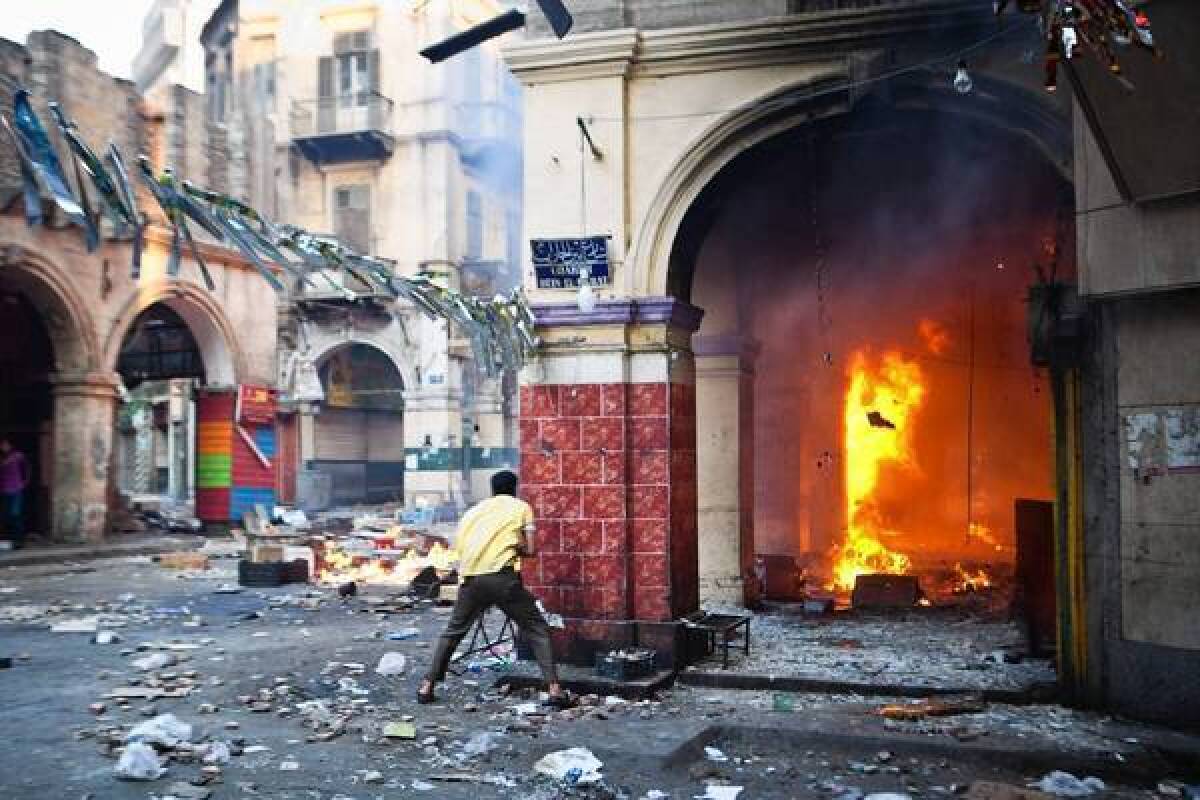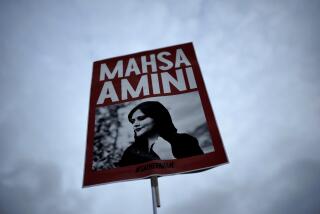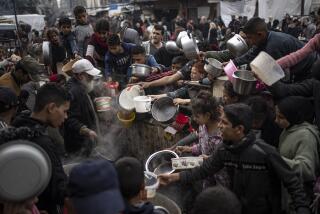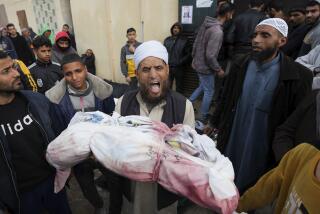Dozens more killed amid continued violence in Egypt

CAIRO — Clashes between security forces and supporters of the Muslim Brotherhood killed dozens of protesters across Egypt, and vigilantes, some brandishing whips and pipes, roamed Cairo neighborhoods in support of soldiers and police seeking to impose order.
Tens of thousands of supporters of deposed Islamist President Mohamed Morsi marched toward Ramses Square in downtown Cairo on Friday, declared a “Day of Rage” by protesters. Police and men in civilian clothes met them with birdshot and live bullets. Demonstrators carried the dead and wounded through tear gas to a makeshift field hospital in a nearby mosque.
Doctors at the hospital said at least 52 demonstrators had been killed. News reports said more than 40 people died in clashes that spread to Alexandria, Ismailia, Damietta, Fayoum and other cities. Egypt’s military-backed government said there were 27 confirmed deaths nationwide.
Much of the violence calmed after a 7 p.m. curfew, but battles echoed across the capital. The skyline glowed with flames spreading through the state-run Arab Contractors building. Men with rocks and clubs roamed amid the smoke of burning tires in scenes reminiscent of the relentless violence between security forces and an Islamist insurgency in the 1990s.
The bloodshed came a day after the Interior Ministry announced police would respond with live ammunition if attacked. That warning did not deter surges of protesters, a growing number of whom are not Brotherhood sympathizers, but who were angered by raids on two sit-ins Wednesday that killed about 600 Morsi supporters.
The marches Friday pushed this nation further into disarray. There was no sign of reconciliation; at one point pro-Morsi supporters jumped off a Cairo bridge to escape gunfire. The military, which overthrew Morsi last month, vowed that it would not relent, and the Brotherhood, seeking to reenergize its base, promised to fill the streets until the former president is returned to power.
“I have no gun. I have no knife. I only have my body marching here. If I am killed it is for my freedom,” said Issam Ibrahim, an engineer, as army helicopters buzzed overhead. “Can the military withstand this kind of pressure? I doubt it. It may take days, weeks, but we are marching for legitimacy.”
He added: “I’m not even a Brotherhood supporter. Did you see the massacre in cold blood by police on Wednesday? You wouldn’t treat animals like that.”
“You tell the world,” said another man. “You tell the world what we are doing.”
After more than six weeks of unrest, nerves were frayed and passions still intensifying. Pro- and anti-Morsi demonstrators clashed in some neighborhoods, and churches were attacked by Islamists angered by Coptic Christians’ support for the military.
Car radios crackled with a new song popular among Brotherhood followers: “Egypt is Islamic.” Opposing camps marched beneath the posters of their heroes — Morsi for the Brotherhood, and Gen. Abdel Fattah Sisi, commander of the armed forces, for liberals and secularists.
Tear gas and smoke blossomed in the air as marches swelled through the capital. Brotherhood supporters waved flags, chanted “God is Great” and shielded their faces from the sun with cardboard boxes. Scuffles broke out with supporters of the military. Men with spray cans cooled the crowds with water as marchers in the Nasr City neighborhood headed toward Ramses Square.
“I am against the coup and Gen. Sisi,” said Saber Khalil. “Look at how many people there are now, and this is only one of many marches. The military has killed people.”
As they did in the uprising that overthrew President Hosni Mubarak in 2011, vigilantes roamed the streets, including the corniche along the Nile, where a man with a whip and another with a silver pipe checked cars for anyone suspicious.
“There’s fighting between Muslims and Christians near the church,” said the one with the pipe. Moments before he had watched as a man brandishing an automatic rifle raced past on a motorcycle, while in the opposite direction an armored personnel carrier sped down the highway.
Political tension reverberated throughout the day. Liberals who supported the coup have condemned the army for the violence. Nobel laureate Mohamed ElBaradei resigned as vice president this week. And on Friday, Khaled Dawood, spokesman for the National Salvation Front, a liberal umbrella group that includes ElBaradei, quit his post.
“I can no longer speak on behalf of the majority of the front’s parties, which have clearly decided to support the confrontation between security forces and the Muslim Brotherhood, refusing to condemn the massacre committed by security forces,” Dawood said. “Violence only breeds more violence.”
The interim government reacted with defiance to international criticism, including from President Obama, who canceled joint military exercises next month in response to Wednesday’s deaths. Officials here have cast Brotherhood leaders, many of whom are imprisoned, as orchestrators of a terrorist plot.
“Egypt is faced with acts of terrorism that are targeting governmental buildings and ... scores of churches, courts, police stations,” acting President Adly Mahmoud Mansour said Friday in response to Obama. “Egypt is appreciating all sincere stances by world countries but asserts at the same time its keenness on its full sovereignty and independence.”
As protesters marched Friday, people looked down from balconies; some waved, others ridiculed the demonstrators. The march moved on, swelling over sidewalks, turning at roads blocked by police barricades. Some of the marchers said they wanted democracy, others legitimacy. One bearded man held up a sign: “Egypt is Islamic, not secular.”
The marchers passed Al Imam mosque, where as many as 150 bodies of those killed Wednesday had lain until late Thursday. Flies buzzed, clothes of the dead were coiled in bunches on the grounds, and the names of the fallen were written on cardboard and fastened to the mosque’s locked gates. The ice that had cooled the bodies to cut the stench of death was stacked in melting blocks in the shade.
A woman with a wilting rose and an open Koran sat across from the mosque. She fled one of the sit-ins and had been waiting for days to collect the body of a neighbor’s son who had been shot in the stomach. The men at the mosque told her all the dead had been collected. She did not believe them. She waited with her young daughter, who wore a black headband that read, “There is no God but God.”
“The people who gave Morsi his legitimacy have taken it back,” said Nabil Reda, a trustee of the mosque, who stood behind the gates. “We are praying to God so he can calm things down. We are at the peak of the danger now.... It’s not about who’s wrong or right anymore.”
Another man put his face to the gates and asked about a body.
He, too, was told the dead were gone.
Times staff writer Raja Abdulrahim and special correspondent Ingy Hassieb contributed to this report.
More to Read
Start your day right
Sign up for Essential California for news, features and recommendations from the L.A. Times and beyond in your inbox six days a week.
You may occasionally receive promotional content from the Los Angeles Times.







